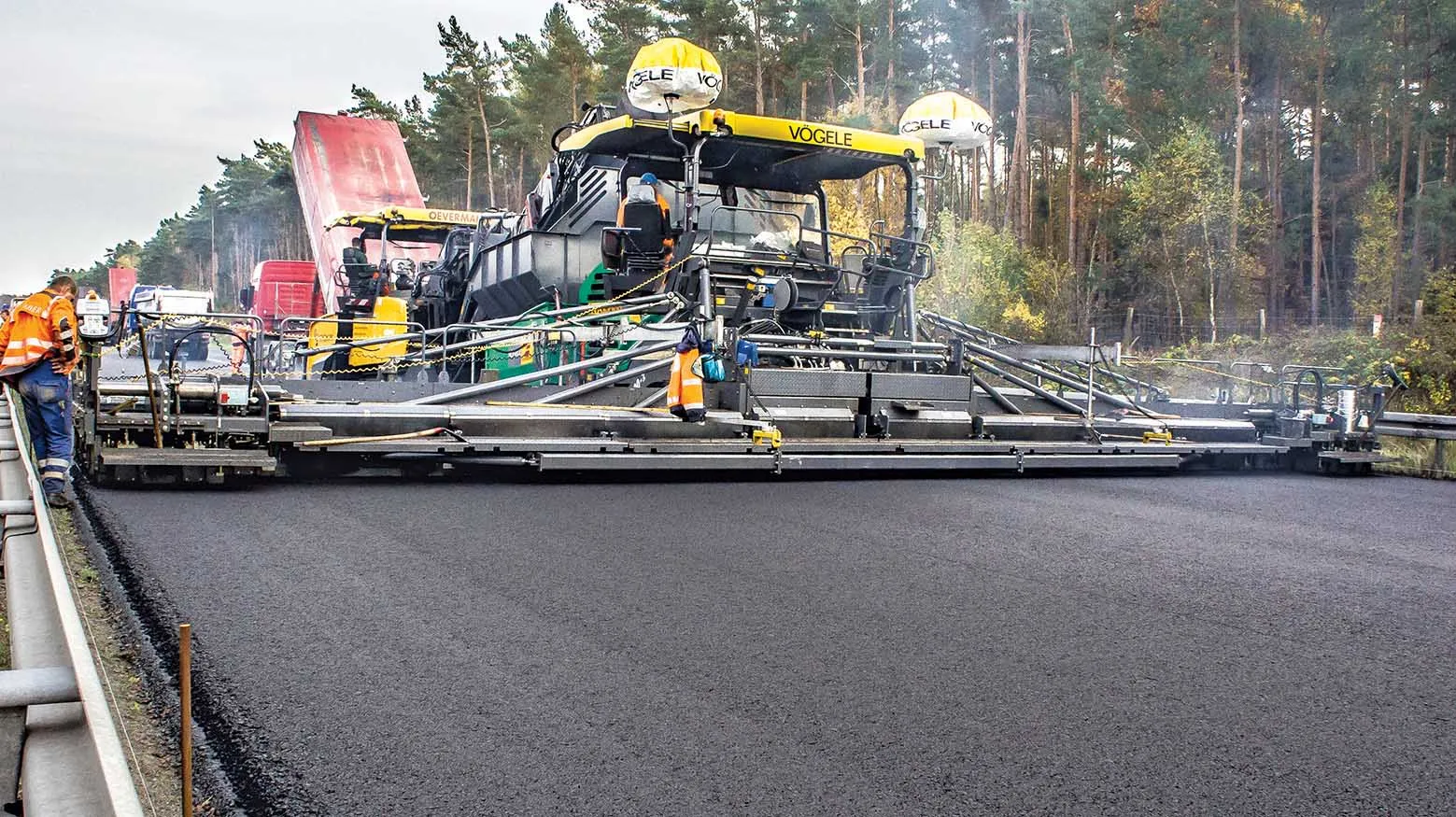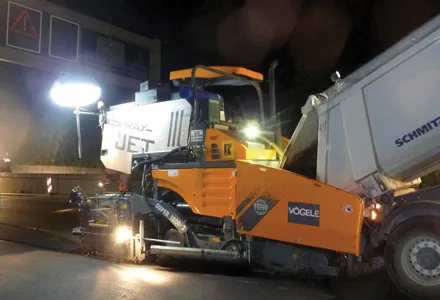Contractor Matthäi used machine technology from Vögele to place surface course on the new stretch of the B 442 Federal road near Eimbeckhausen in Lower Saxony, Germany. After two years of construction, the residents of Eimbeckhausen are finally rid of the barrage of traffic that had rushed through their small village near Hanover on the B 442 Federal road for decades. Towards the end, almost 14,000 vehicles had been counted per day, 15 – 19% of which were HGVs. All vehicles are now diverted along the four k
July 20, 2012
Read time: 2 mins
Contractor 4902 Matthäi used machine technology from Vögele to place surface course on the new stretch of the B 442 Federal road near Eimbeckhausen in Lower Saxony, Germany.
After two years of construction, the residents of Eimbeckhausen are finally rid of the barrage of traffic that had rushed through their small village near Hanover on the B 442 Federal road for decades. Towards the end, almost 14,000 vehicles had been counted per day, 15 – 19% of which were HGVs. All vehicles are now diverted along the four kilometre stretch of new trunk road to the south of the village.
For the B 442 extension, paving teams placed a 10cm thick base course followed by a 9cm asphalt binder course of asphaltic concrete. For the surfacing of stone mastic asphalt (SMA), 3cm thick, the men headed by site manager Jörg Gattkowski worked with two and, on some sections, even three1194 Vögele machines paving ‘hot to hot’. This method was said to not only speeds up the entire paving process, but also significantly improve the quality of the wearing course, ensuring perfect joints and thus considerably enhancing the road’s durability.
Most of the asphalt work was undertaken by a SUPER 1900-2 and a SUPER 1800-2. These two versatile, high-performance tracked pavers can be used for a large variety of jobs – motorways, country roads, squares and roundabouts. In Eimbeckhausen, both machines came with an AB 500 Extending Screed in TP1 version. Bolt-on extensions were fitted for a maximum pave width of 6.5m. As a result, asphalt for the wearing course could be paved on the 11.5m wide roadway and the 12.5m wide bridge decks without a need for conversion. On some stretches, a third machine came into play: a wheeled SUPER 1303-2 combined with an AB 340 Extending Screed in TV version was used for surfacing the passing places.
To ensure precise grade and slope control when paving wearing course, the SUPER 1800-2 and SUPER 1900-2 were fitted with a Big MultiPlex Ski.
After two years of construction, the residents of Eimbeckhausen are finally rid of the barrage of traffic that had rushed through their small village near Hanover on the B 442 Federal road for decades. Towards the end, almost 14,000 vehicles had been counted per day, 15 – 19% of which were HGVs. All vehicles are now diverted along the four kilometre stretch of new trunk road to the south of the village.
For the B 442 extension, paving teams placed a 10cm thick base course followed by a 9cm asphalt binder course of asphaltic concrete. For the surfacing of stone mastic asphalt (SMA), 3cm thick, the men headed by site manager Jörg Gattkowski worked with two and, on some sections, even three
Most of the asphalt work was undertaken by a SUPER 1900-2 and a SUPER 1800-2. These two versatile, high-performance tracked pavers can be used for a large variety of jobs – motorways, country roads, squares and roundabouts. In Eimbeckhausen, both machines came with an AB 500 Extending Screed in TP1 version. Bolt-on extensions were fitted for a maximum pave width of 6.5m. As a result, asphalt for the wearing course could be paved on the 11.5m wide roadway and the 12.5m wide bridge decks without a need for conversion. On some stretches, a third machine came into play: a wheeled SUPER 1303-2 combined with an AB 340 Extending Screed in TV version was used for surfacing the passing places.
To ensure precise grade and slope control when paving wearing course, the SUPER 1800-2 and SUPER 1900-2 were fitted with a Big MultiPlex Ski.








